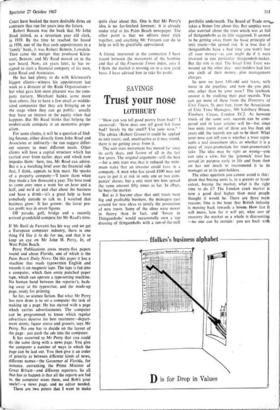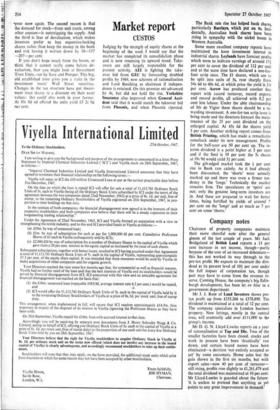Trust your nose
SAVINGS LOTHBURY
'"How can you tell good poetry from bad?" I answered : "How does one tell good fish from bad? Surely by the smell/ Use your nose." ' The advice (Robert Graves's) could be applied to unit trusts: and, unattractive as it may sound, there is no getting away from it.
The unit trust movement has moved far since its early days, and fastest of all in the last few years. The original argument—still the best —for a unit trust was that it reduced the mini- mum stake that an investor could have in a company. A man who has saved £100 may not care to put it at risk in only one or two com- panies' shares: but a unit trust lets him spread the same amount fifty times as far. In effect, he buys the market.
But as it became clear that unit trusts were big and profitable business, the managers cast around for new ideas to justify the promotion of new trusts. Some of the ideas were newer in theory than in fact, and 'Invest in Thingumbobs' would occasionally own a top dressing of thingumbobs with a run-of-the-mill portfolio underneath. The Board of Trade now..., takes a firmer line about this. But sceptics were also worried about the trust which was as full of thingumbobs as its title suggested. It seemed to be getting away from the basic principle of
unit trusts—the spread risk. It is true that if thingumbobs have a bad time you won't lose
all your money—as you might do if it were invested in one particular thingumbob-maker. But the risk is real. The Israel Unit Trust was
wound up the other day : unit-holders had lost one sixth of their money, plus management charges.
So now we have I50-odd unit trusts, with more in the pipeline; and how do you pick one, other than by your nose? The textbook
answer is by studying their past records. You can get most of these trom the Directory of Unit Trusts, 5s, post free, from the Association
of Unit Trust Managers, 306 Salisbury House, Finsbury Circus, London EC2. As between trusts of the same sort, records can be com- pared and in later articles will be—but since two units trusts out of three are less than six
years old, the records are apt to be short. What your nose can tell you is whether a trust repre- sents a real investment idea, or whether it is a
piece of trust-promotion for trust-promotion's
sake. The idea may be right or wrong—you can take a view; but the 'gimmick' trust has served its purpose early in life and from then on has not much to recommend it to its manager or to its unit-holders.
The other question you cannot avoid is this: given that buying units is, to a greater or lesser extent, buying the market, what is the right time to do it? The London stock market is
now a good deal higher than most people thought it would be. There are three main reasons. One is the hope that British industry
is moving back towards a boorno How fast It will move, how far it will get, what sort of
recovery the market as a whole is discounting —no one can be certain: you are back with
' your nose again. The second reason is that the demand for stock—from unit trusts, among other sources—is outstripping the supply. And the third is fear of devaluation, which makes investors prefer to buy expensive-looking shares rather than keep the money in the bank and risk having it written down by 10-15?
• -20?—per cent.
If you don't hope much from the boom, or think that it cannot really come before de- valuation, then you might look at Investment Trust Units, run by Save and Prosper. This big, old established trust gives you a stake in the investment trusts' Wall Street securities. Changes in the tax structure have put invest- ment trust shares to a discount on their asset values: this could also work in your favour. At lOs 8d xd offered the units yield £3 2s 9d mer cent.











































 Previous page
Previous page